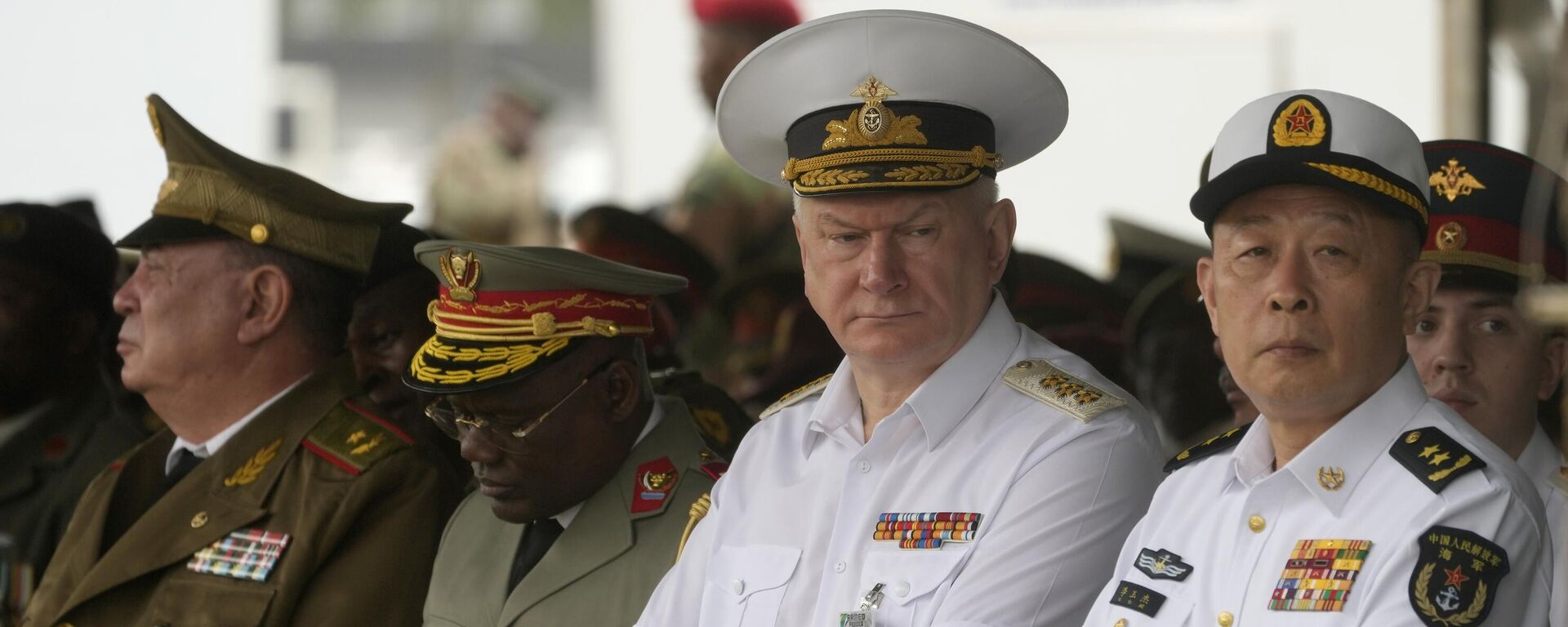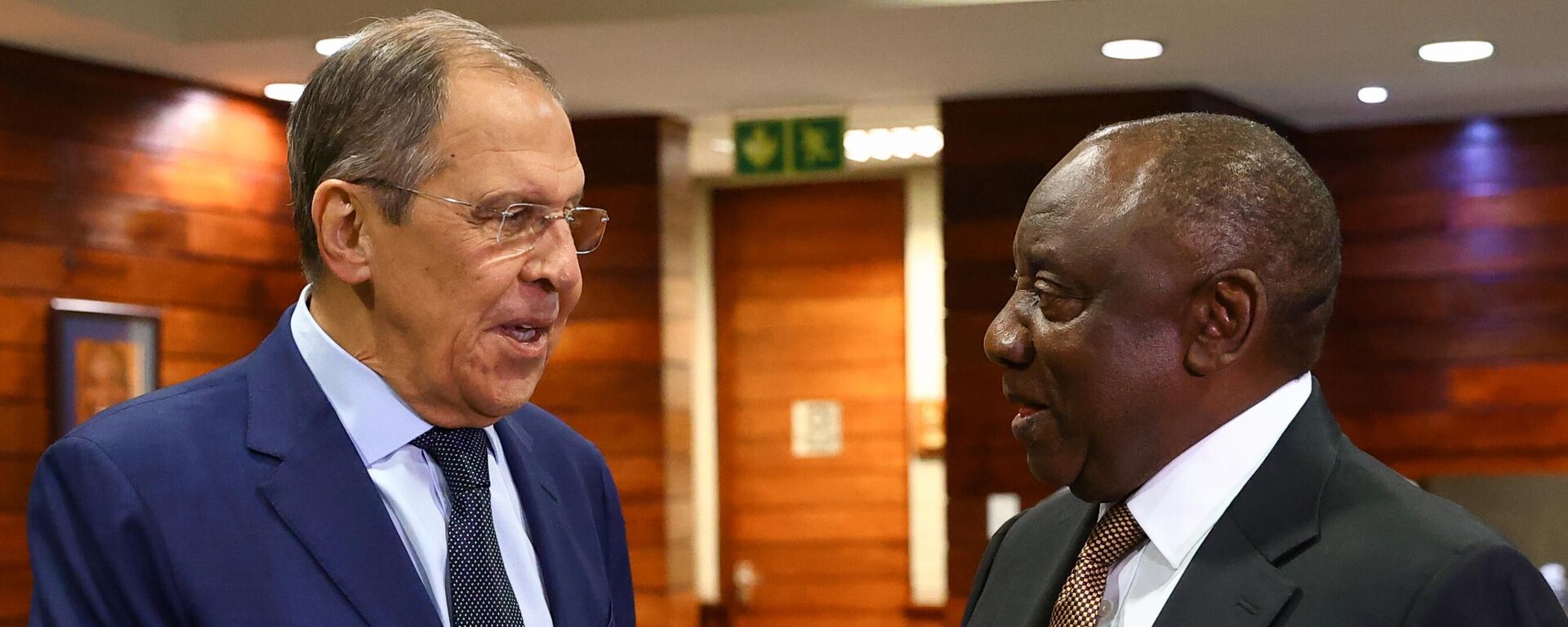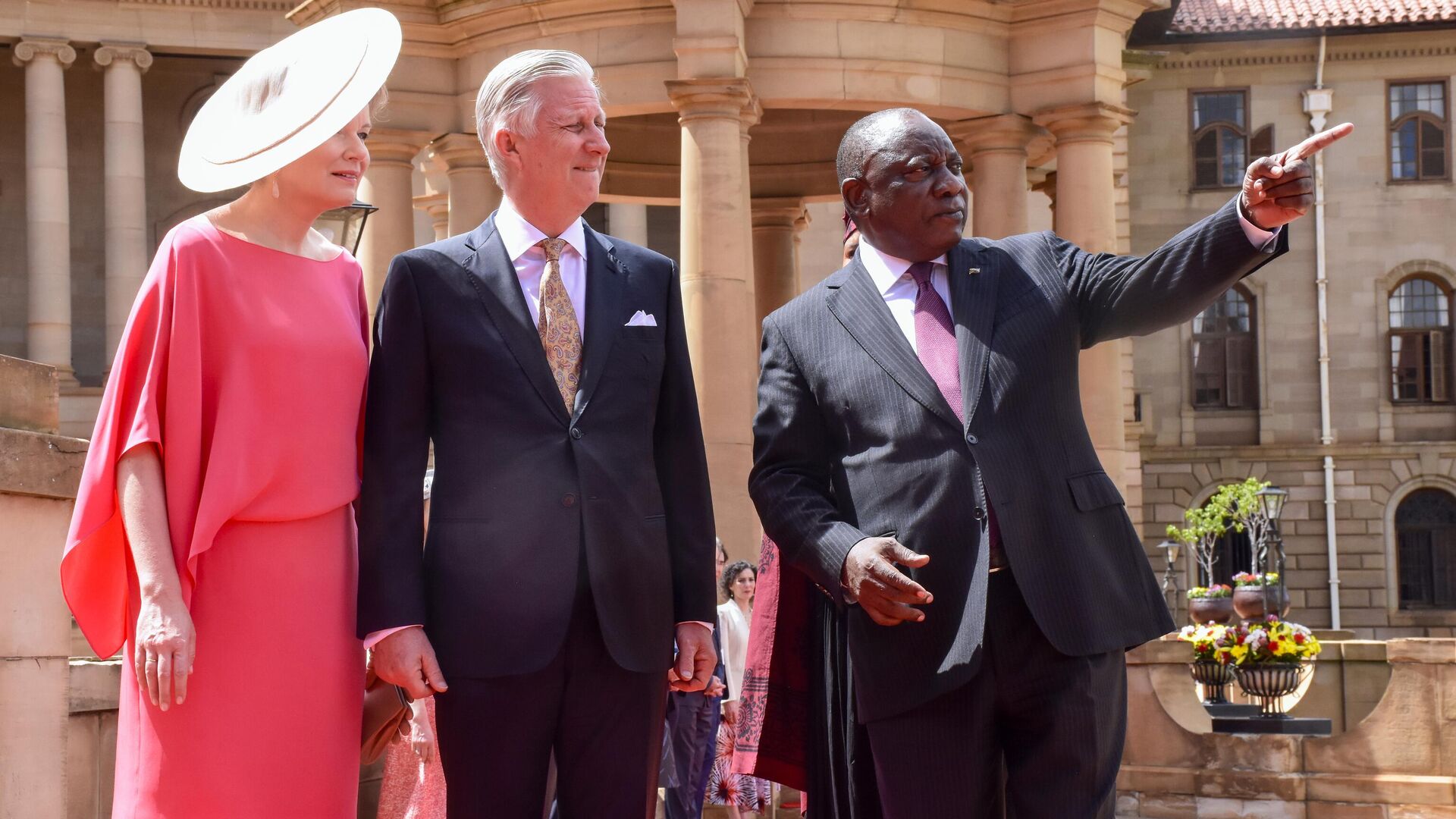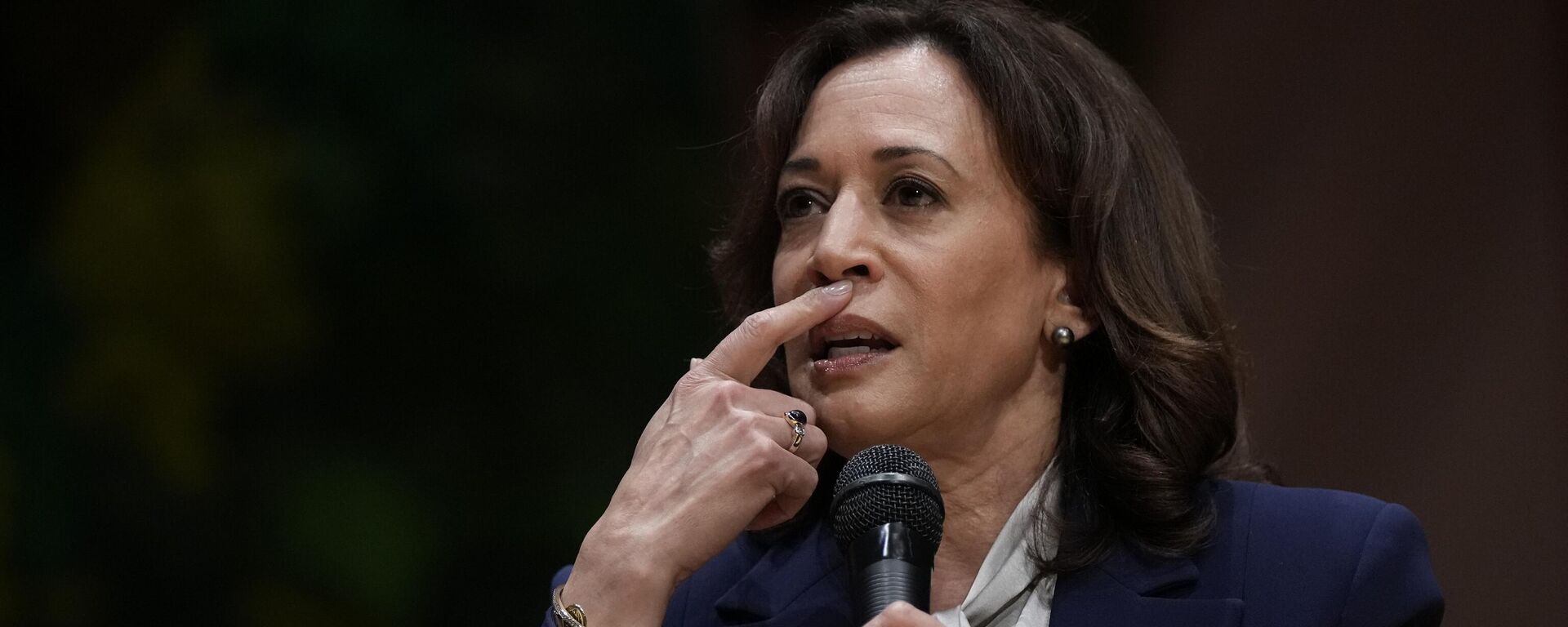https://sputnikglobe.com/20230325/western-officials-africa-visits-are-charming-exercise-to-protect-material-interests-experts-say-1108777867.html
Western Officials' Africa Visits Are 'Charming Exercise to Protect Material Interests', Experts Say
Western Officials' Africa Visits Are 'Charming Exercise to Protect Material Interests', Experts Say
Sputnik International
Increasing frequency of western countries' top officials' visits to the African continent is part the West's strife to keep its foothold there, as well as to counter China and Russia activity in the region, expert tells Sputnik.
2023-03-25T13:04+0000
2023-03-25T13:04+0000
2023-03-26T06:14+0000
africa
africa insight
us
belgium
west
france
russia
china
neocolonialism
colonialism
https://cdn1.img.sputnikglobe.com/img/07e7/03/19/1108779480_0:160:3073:1888_1920x0_80_0_0_1abfebe59d5382c87bfb71ecbf39df35.jpg
The increasing frequency of Western countries' top officials' visits to Africa is part of the West's effort to keep its foothold there, as well as to counter China and Russia's activity in the region, Ian Liebenberg, professor of politics at the University of Namibia (UNAM), Windhoek, Namibia, and professor-extraordinary at the Faculty of Military Science at Stellenbosch University, South Africa, tells Sputnik, adding that the concern with the continent is a "competition for hearts and minds."In recent months, senior Western officials such as US Secretary of State Antony Blinken, French President Emmanuel Macron, US Secretary of the Treasury Janet Yellen, US First Lady Jill Biden, and others have paid official visits to a number of African nations. In addition, US Vice President Kamala Harris is starting her visit to Ghana, Tanzania, and Zambia.Against the background of the recent frequent trips of leading Western politicians to Africa, at the end of March, Belgium's King Philippe and Queen Mathilda arrived for the first time on a multi-day state visit to South Africa. According to the expert, the West is trying to preserve its strategic position and keep the possibility of gaining African resources.In 2022 and 2023, France pulled its troops out from Mali and Burkina Faso respectively at the demand of local military governments and against the backdrop of a dramatic deterioration in relations with them.Steven Gruzd, head of African Governance and Diplomacy Program, South African Institute of International Affairs (SAIIA), in his turn, believes that Africa has become such a popular destination for Western officials due to its UN-representation, as well as thanks to business matters on the continent. Liebenberg believes that the West could aim to use African votes in the UN to support Western initiatives – specifically, anti-Russian ones.In October 2022, 19 African countries, including Zimbabwe, the Central African Republic, Ethiopia, Eritrea, Mali, the Republic of the Congo, Sudan, Uganda, Ethiopia, and South Africa abstained from voting for a United Nations General Assembly resolution condemning Russia for holding referendums in the DPR, LPR, Kherson, and Zaporozhye regions.Both experts have also touched upon the historical backgrounds of todays' Africa-West relations, emphasizing how Western colonialism has affected African nations.Gruzd highlights Belgium's controversial role in the history of the Democratic Republic of the Congo.King Philippe is a descendant of Belgian King Leopold II, who ruled in 1865-1909. In 1885, he created the colony of the Congo Free State (now the Democratic Republic of the Congo), of which Leopold was the sole owner. According to modern estimates, the scale of the Congolese population decline during the first 23 years of Belgium's rule range from 1.5 million to more than 10 million. Studies show that millions of Congolese died due to murder, famine, and disease at the time.Moreover, in 2002, Belgium admitted to "an irrefutable portion of responsibility" in the events that led to the 1961 death of Congolese anticolonial leader Patrice Lumumba, of which, the expert outlines, Africans have not forgotten.Liebenberg stresses that Africans will not forget the suffering and pain that was brought to the continent by the colonizers.Liebenberg brings up examples of how the Western colonizers affected the lives of thousands in Africa.Talking about modern times, the expert recalls Libya's tragedy, when a coalition of Western states destroyed the once thriving African nation.He also underlines that even after gaining independence, many African states were cut off from the "economic growth loop" due to continuous Western pressure.
https://sputnikglobe.com/20230324/harris-on-africa-trip-to-raise-us-concerns-over-influence-of-china-russia-official-says-1108749556.html
https://sputnikglobe.com/20230222/washington-does-not-want-to-force-africa-to-choose-sides-in-military-cooperation-us-army-general-1107700327.html
https://sputnikglobe.com/20230228/wests-ironic-comedy-fatf-graylisted-south-africa-over-ties-with-russia-expert-says-1107866004.html
africa
belgium
west
france
russia
china
Sputnik International
feedback@sputniknews.com
+74956456601
MIA „Rossiya Segodnya“
2023
News
en_EN
Sputnik International
feedback@sputniknews.com
+74956456601
MIA „Rossiya Segodnya“
Sputnik International
feedback@sputniknews.com
+74956456601
MIA „Rossiya Segodnya“
belgium king, leopold the second, leopold ii, king philippe and queen mathilda, us secretary of state anthony blinken, french president macron, us secretary of the treasury janet yellen, us first lady jill biden, western colonialism, western neocolonialism
belgium king, leopold the second, leopold ii, king philippe and queen mathilda, us secretary of state anthony blinken, french president macron, us secretary of the treasury janet yellen, us first lady jill biden, western colonialism, western neocolonialism
Western Officials' Africa Visits Are 'Charming Exercise to Protect Material Interests', Experts Say
13:04 GMT 25.03.2023 (Updated: 06:14 GMT 26.03.2023) At the end of March, Belgian King Philippe's first multi-day state visit to South Africa became yet another among Western officials' and leaders' trips to Africa, which have significantly intensified in recent months.
The increasing frequency of Western countries' top officials' visits to Africa is part of the West's effort to keep its foothold there, as well as to counter China and Russia's activity in the region, Ian Liebenberg, professor of politics at the University of Namibia (UNAM), Windhoek, Namibia, and professor-extraordinary at the Faculty of Military Science at Stellenbosch University, South Africa, tells Sputnik, adding that the concern with the continent is a "competition for hearts and minds."
In recent months, senior Western officials such as US Secretary of State Antony Blinken, French President Emmanuel Macron, US Secretary of the Treasury Janet Yellen, US First Lady Jill Biden, and others have paid official visits to a number of African nations. In addition, US Vice President Kamala Harris is starting her visit to Ghana, Tanzania, and Zambia.
Against the background of the recent frequent trips of leading Western politicians to Africa, at the end of March, Belgium's King Philippe and Queen Mathilda arrived for the first time on a multi-day state visit to South Africa.
According to the expert, the West is trying
to preserve its strategic position and keep the possibility of gaining African resources.
"These visits by Western leaders are apparently a concerted charming exercise to gain goodwill in Africa to protect Western material interests (diamond, gold, uranium) as well as their strategic footholds, especially after France was pushed out of Western Africa, which the French dominated for many, many years as a neo-colonial power," the expert notes.
In 2022 and 2023, France pulled its troops out from Mali and Burkina Faso respectively at the demand of local military governments and against the backdrop of a dramatic deterioration in relations with them.
Steven Gruzd, head of African Governance and Diplomacy Program, South African Institute of International Affairs (SAIIA), in his turn, believes that Africa has become such a popular destination for Western officials due to its UN-representation, as well as thanks to business matters on the continent.
"I think Africa has become a popular destination because it has many countries, many votes in the United Nations, and there are a lot of business opportunities [...]," Gruzd says. "And I think the Belgian visit should be seen in that context."
Liebenberg believes that the West could aim to use African votes in the UN to support Western initiatives – specifically, anti-Russian ones.
"As many African states for obvious reasons abstained from voting last year in the UN General Assembly (UNGA), they (the Western states) may wish to try to convince African states to vote against Russia in the next round," the expert outlines.
In October 2022, 19 African countries, including Zimbabwe, the Central African Republic, Ethiopia, Eritrea, Mali, the Republic of the Congo, Sudan, Uganda, Ethiopia, and South Africa abstained from voting for a United Nations General Assembly resolution
condemning Russia for holding referendums in the DPR, LPR, Kherson, and Zaporozhye regions.
Both experts have also touched upon the historical backgrounds of todays' Africa-West relations, emphasizing how Western colonialism has affected African nations.
Gruzd highlights Belgium's controversial role in the history of the Democratic Republic of the Congo.
"Belgium has a very controversial legacy in terms of the Congo and what happened there," the expert says. "The Belgian colonization by King Leopold was especially cruel and much wealth was extracted from Africa to the Belgian capital and to Belgium, which I think has strained relations. It is a factor that is in the background.

22 February 2023, 16:32 GMT
King Philippe is a descendant of Belgian King Leopold II, who ruled in 1865-1909. In 1885, he created the colony of the Congo Free State (now the Democratic Republic of the Congo), of which Leopold was the sole owner. According to modern estimates, the scale of the Congolese population decline during the first 23 years of Belgium's rule range from 1.5 million to more than 10 million. Studies show that millions of Congolese died due to murder, famine, and disease at the time.
Moreover, in 2002, Belgium admitted to "an irrefutable portion of responsibility" in the events that led to the 1961 death of Congolese anticolonial leader Patrice Lumumba, of which, the expert outlines, Africans have not forgotten.
"I don't think anybody has forgotten the colonial history or indeed the history of Patrice Lumumba," the expert says. "But I think those things are obviously going to be put aside and not obstruct the visit of the king and his delegation."
Liebenberg stresses that Africans will not forget the suffering and pain that was brought to the continent by the colonizers.
"All people, including us as Africans, have long historical memories especially when we suffered, were killed, such as during colonialist periods," the expert stresses.
Liebenberg brings up examples of how the Western colonizers affected the lives of thousands in Africa.
"You can see it in Namibia, where the Herero population are insisting on reparations to be paid by Germany to the Herero for their colonial genocide by the Germans in Namibia, 1904 to 1908," the expert notes. "Likewise, the Nama people feel the same here in Namibia, as they also experienced a similar genocide at the time."

28 February 2023, 15:51 GMT
Talking about modern times, the expert recalls Libya's tragedy, when a coalition of Western states destroyed the once thriving African nation.
"Many Africans remember how in 2011, France, the UK, the USA, Italy and even smaller NATO countries such as the Netherlands toppled a stable state in Libya with disastrous consequences still lasting up till today," the expert says. "All these things play a role... These must be disconcerting signs to the West, I guess."
He also underlines that even after gaining independence, many African states were cut off from the "economic growth loop" due to continuous Western pressure.
"Many remember that under Western pressure after independence, African states were frequently kept out of the 'economic growth loop' (neo-colonialist mentalities from the West that caused the development of underdevelopment on the African continent) and that the West benefitted the most, leading to dependency on Western economies, and this is now slowly but surely changing," the expert notes.





